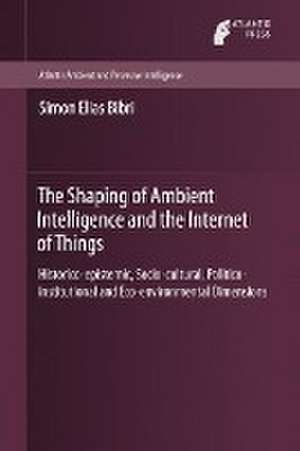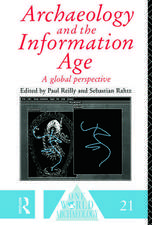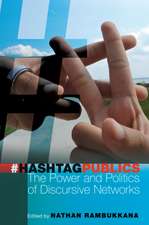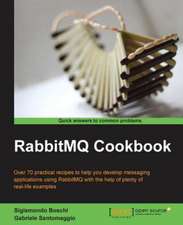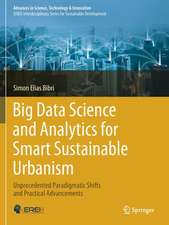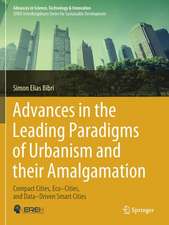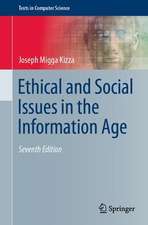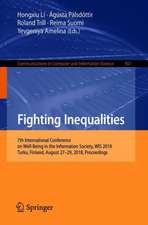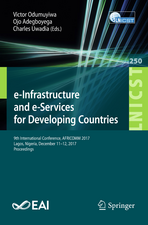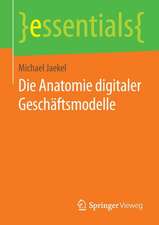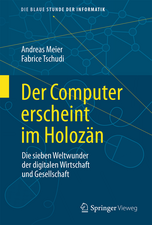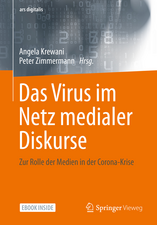The Shaping of Ambient Intelligence and the Internet of Things: Historico-epistemic, Socio-cultural, Politico-institutional and Eco-environmental Dimensions: Atlantis Ambient and Pervasive Intelligence, cartea 10
Autor Simon Elias Bibrien Limba Engleză Hardback – 17 noi 2015
An interdisciplinary approach is indeed necessary to understand the complex issue of scientific and technological innovations that S&T are not the only driving forces of the modern, high–tech society, as well as to respond holistically, knowledgeably, reflectively, and critically to the most pressing issues and significant challenges of the modern world.
This book is the first systematic study on how AmI and the IoT applications of scientific discovery link up with other developments in the spheres of the European society, including culture, politics,policy, ethics and ecological philosophy. It situates AmI and the IoT developments and innovations as modernist science–based technology enterprises in a volatile and tense relationship with an inherently contingent, heterogeneous, fractured, conflictual, plural, and reflexive postmodern social world.
The issue’s topicality results in a book of interest to a wide readership in science, industry, politics, and policymaking, as well as of recommendation to anyone interested in learning the sociology, philosophy, and history of AmI and the IoT technologies, or to those who would like to better understand some of the ethical, environmental, social, cultural, and political dilemmas to what has been labeled the technologies of the 21st century.
Preț: 340.32 lei
Preț vechi: 425.40 lei
-20% Nou
Puncte Express: 510
Preț estimativ în valută:
65.12€ • 67.100$ • 53.77£
65.12€ • 67.100$ • 53.77£
Carte tipărită la comandă
Livrare economică 15-29 aprilie
Preluare comenzi: 021 569.72.76
Specificații
ISBN-13: 9789462391413
ISBN-10: 9462391416
Pagini: 300
Ilustrații: XXVI, 301 p.
Dimensiuni: 155 x 235 x 25 mm
Greutate: 0.64 kg
Ediția:1st ed. 2015
Editura: ATLANTIS PRESS
Colecția Atlantis Press
Seria Atlantis Ambient and Pervasive Intelligence
Locul publicării:Paris, Netherlands
ISBN-10: 9462391416
Pagini: 300
Ilustrații: XXVI, 301 p.
Dimensiuni: 155 x 235 x 25 mm
Greutate: 0.64 kg
Ediția:1st ed. 2015
Editura: ATLANTIS PRESS
Colecția Atlantis Press
Seria Atlantis Ambient and Pervasive Intelligence
Locul publicării:Paris, Netherlands
Public țintă
GraduateCuprins
Introduction.- Understanding the Research and Academic Field of STS.- Conceptual Background, Theoretical Framework, Academic Discourses, and Research Methodologies.- The Nature and Practices of AmI: Historical a Priori, Epistemic, Institutional, Political, and Socio–cultural Perspectives.- Paradigmatic and Discursive Dimensions of AmI and the IoT and Knowledge/Power Relations, Subject Positioning, and Legitimation.- AmI and the IoT and Environmental and Societal Sustainability: Risks, Challenges, and Underpinnings.- Ethical Implications of AmI and the IoT: Risks to Privacy, Security, and Trust, and Prospective Technological Safeguards.- Democratizing AmI and the IoT: The Power and Influence of Social Innovation and Participative and Humanistic Design.
Notă biografică
Simon E. Bibri is a PhD Candidate at the Norwegian University of Science and Technology (NTNU), Trondheim, Norway. He has a true passion for academic and lifelong learning and a natural thirst for knowledge. Having above all been intrigued by the relationship between scientific knowledge, technological systems, and society, he has wittingly and voluntarily chosen to pursue an unusual academic journey by embarking on studying a diverse range of subject areas – at the interaction of Science, Technology, and Society. His intellectual pursuits and endeavors have resulted, hitherto, in an educational background encompassing knowledge from, and meta–knowledge about, different academic disciplines. He holds a Bachelor of Science in computer engineering with a major in ICT strategy, a research–based Master of Science in computer science with a focus on Ambient Intelligence and ICT for sustainability, a Master of Science in computer science with a major in informatics, a Master of Sciencein entrepreneurship and innovation with a focus on new venture creation, a Master of Science in strategic leadership towards sustainability, a Master of Science in sustainable urban planning and development, a Master of Social Science with a major in business administration (MBA), a Master of Arts in communication and media for social change and a postgraduate degree in management and economics. In addition, he has a number of certificates, including innovation science, economics of innovation, teaching for sustainability, corporate entrepreneurship, project management, and policy in the European Union. He has received his Master’s degrees and certificates from different universities in Sweden, namely Lund University, West University, Blekinge Institute of Technology, Malmö University, and Halmstad University.
Before starting his Master studies’ endeavor, Bibri worked as an ICT strategist. In 2004, he founded a small business and consulting firm where heserved as a sustainability and green ICT strategist and consultant. Over the last few years, he has been involved in a number of research and consulting projects pertaining to the IoT, green ICT strategy, strategic sustainability innovations, circular business model innovation, clean and energy efficiency technology, sustainable urban planning, and sustainable urban models (eco–city, smart city, and compact city). Since his graduation in June 2014, he has been working as a freelance consultant in his areas of expertise and a research associate, giving lectures on specialized topics, and writing his second book.
Bibri has a genuine interest in interdisciplinary and transdisciplinary research. In light of his varied academic background, his research interests include AmI, the IoT, social shaping of science–based technology, philosophy and sociology of scientific knowledge, sustainability transitions and innovations, urban sustainability, eco–city and smartcity, governance of sociotechnical changes in technological innovation systems, green and knowledge–intensive innovation, clean and energy efficiency technology, green and circular economy, and S&T and innovation policy.
Textul de pe ultima copertă
Recent advances in ICT have given rise to new socially disruptive technologies: AmI and the IoT, marking a major technological change which may lead to a drastic transformation of the technological ecosystem in all its complexity, as well as to a major alteration in technology use and thus daily living. Yet no work has systematically explored AmI and the IoT as advances in science and technology (S&T) and sociotechnical visions in light of their nature, underpinning, and practices along with their implications for individual and social wellbeing and for environmental health. AmI and the IoT raise new sets of questions: In what way can we conceptualize such technologies? How can we evaluate their benefits and risks? How should science–based technology and society’s politics relate? Are science-based technology and society converging in new ways? It is with such questions that this book is concerned. Positioned within the research field of Science and Technology Studies (STS), which encourages analyses whose approaches are drawn from a variety of disciplinary perspectives, this book amalgamates an investigation of AmI and the IoT technologies based on a unique approach to cross–disciplinary integration; their ethical, social, cultural, political, and environmental effects; and a philosophical analysis and evaluation of the implications of such effects.
This book is the first systematic study on how AmI and the IoT applications of scientific discovery link up with other developments in the spheres of the European society, including culture, politics, policy, ethics and ecological philosophy. It situates AmI and the IoT developments and innovations as modernist science–based technology enterprises in a volatile and tense relationship with an inherently contingent, heterogeneous, fractured, conflictual, plural, and reflexive postmodern social world.
The issue’s topicality results in a book of interest to a wide readership in science, industry, politics, and policymaking, as well as of recommendation to anyone interested in learning the sociology, philosophy, and history of AmI and the IoT technologies, or to those who would like to better understand some of the ethical, environmental, social, cultural, and political dilemmas to what has
been labeled the technologies of the 21st century.Caracteristici
Offers a novel, compelling approach to the study of AmI and the IoT in terms of the complex, dialectic interplay between their development and innovation and their historico–epistemic, socio–cultural, and eco–environmental dimensions Combines academic, scientific and practical relevance with philosophical, historical, social, ethical and environmental analysis and evaluation – worked out with great care and subtlety of detail Adopts a unique approach to cross–disciplinary integration, incorporating history, sociology, philosophy, innovation studies, sociotechnical studies, cultural studies, environmental studies, technology foresight studies, politics and S&T policy Includes supplementary material: sn.pub/extras
